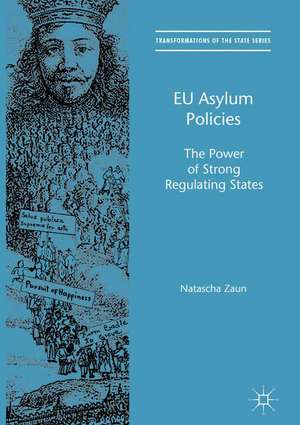EU Asylum Policies: The Power of Strong Regulating States: Transformations of the State
Autor Natascha Zaunen Limba Engleză Hardback – 6 mar 2017
This book fills a significant lacuna in our understanding of the refugee crisis by analyzing the dynamics that lie behind fifteen years of asylum policies in the European Union. It sheds light on why cooperation has led to reinforced refugee protection on paper but has failed to provide it in practice. Offering innovative empirical, theoretical and methodological research on this crucial topic, it argues that the different asylum systems and priorities of the various Member States explain the EU's lack of initiative in responding to this humanitarian emergency. The author demonstrates that the strong regulators of North-Western Europe have used their powerful bargaining positions to shape EU asylum policies decisively, which has allowed them to impose their will on Member States in South-Eastern Europe. These latter countries, having barely made a mark on EU policies, are now facing significant difficulties in implementing them. The EU will only identify potential solutions to the crisis, the author concludes, when it takes these disparities into account and establishes a functioning common refugee policy. This novel work will appeal to students and scholars of politics, immigration and asylum in the EU.
| Toate formatele și edițiile | Preț | Express |
|---|---|---|
| Paperback (1) | 696.02 lei 6-8 săpt. | |
| Springer International Publishing – 20 iul 2018 | 696.02 lei 6-8 săpt. | |
| Hardback (1) | 701.40 lei 6-8 săpt. | |
| Springer International Publishing – 6 mar 2017 | 701.40 lei 6-8 săpt. |
Din seria Transformations of the State
- 15%
 Preț: 583.61 lei
Preț: 583.61 lei -
 Preț: 391.61 lei
Preț: 391.61 lei -
 Preț: 391.61 lei
Preț: 391.61 lei -
 Preț: 389.88 lei
Preț: 389.88 lei -
 Preț: 390.63 lei
Preț: 390.63 lei -
 Preț: 389.88 lei
Preț: 389.88 lei - 15%
 Preț: 641.85 lei
Preț: 641.85 lei -
 Preț: 388.72 lei
Preț: 388.72 lei - 15%
 Preț: 695.70 lei
Preț: 695.70 lei -
 Preț: 393.52 lei
Preț: 393.52 lei -
 Preț: 389.70 lei
Preț: 389.70 lei -
 Preț: 390.63 lei
Preț: 390.63 lei -
 Preț: 388.72 lei
Preț: 388.72 lei - 15%
 Preț: 470.72 lei
Preț: 470.72 lei -
 Preț: 390.63 lei
Preț: 390.63 lei -
 Preț: 389.11 lei
Preț: 389.11 lei -
 Preț: 392.97 lei
Preț: 392.97 lei -
 Preț: 394.87 lei
Preț: 394.87 lei -
 Preț: 389.70 lei
Preț: 389.70 lei -
 Preț: 387.75 lei
Preț: 387.75 lei -
 Preț: 380.63 lei
Preț: 380.63 lei -
 Preț: 383.12 lei
Preț: 383.12 lei -
 Preț: 388.90 lei
Preț: 388.90 lei - 15%
 Preț: 703.38 lei
Preț: 703.38 lei - 15%
 Preț: 643.34 lei
Preț: 643.34 lei - 15%
 Preț: 644.18 lei
Preț: 644.18 lei -
 Preț: 389.88 lei
Preț: 389.88 lei - 15%
 Preț: 641.71 lei
Preț: 641.71 lei -
 Preț: 389.70 lei
Preț: 389.70 lei -
 Preț: 391.02 lei
Preț: 391.02 lei -
 Preț: 387.75 lei
Preț: 387.75 lei -
 Preț: 388.90 lei
Preț: 388.90 lei -
 Preț: 389.70 lei
Preț: 389.70 lei
Preț: 701.40 lei
Preț vechi: 825.17 lei
-15% Nou
Puncte Express: 1052
Preț estimativ în valută:
134.21€ • 140.50$ • 111.05£
134.21€ • 140.50$ • 111.05£
Carte tipărită la comandă
Livrare economică 05-19 aprilie
Preluare comenzi: 021 569.72.76
Specificații
ISBN-13: 9783319398280
ISBN-10: 3319398288
Pagini: 298
Ilustrații: XVI, 315 p. 8 illus., 3 illus. in color.
Dimensiuni: 148 x 210 x 24 mm
Greutate: 0.54 kg
Ediția:1st ed. 2017
Editura: Springer International Publishing
Colecția Palgrave Macmillan
Seria Transformations of the State
Locul publicării:Cham, Switzerland
ISBN-10: 3319398288
Pagini: 298
Ilustrații: XVI, 315 p. 8 illus., 3 illus. in color.
Dimensiuni: 148 x 210 x 24 mm
Greutate: 0.54 kg
Ediția:1st ed. 2017
Editura: Springer International Publishing
Colecția Palgrave Macmillan
Seria Transformations of the State
Locul publicării:Cham, Switzerland
Cuprins
Chapter 1. Introduction: European Asylum Policies in Crisis.- Chapter 2. A Theoretical Framework for the Study of EU Asylum Policy-Making.- Chapter 3. EU Co-operation, Asylum Policies and the Role of Strong Regulators.- Chapter 4. EU Asylum Policies: A Case of Lowest Standard and Race to the Bottom Dynamics?.- Chapter 5. Why EU Asylum Directives Exceed Lowest Common Denominator Standards.- Chapter 6. Why There Is No Race to the Bottom After EU Legislation.- Chapter 7. Conclusion and Outlook: The Power of Strong Regulating States.
Recenzii
“The present book provides a novel and empirically convincing account of why the EU asylum system was not fit for purpose during the refugee crisis. … the book provides an innovative analytical and empirical approach to understanding the regulation of asylum at the European level.” (Ingi Iusmen, Journal of Common Market Studies JCMS, Vol. 56 (5), July, 2018)
Notă biografică
Natascha Zaun is a postdoctoral researcher at the University of Oxford, UK.
Textul de pe ultima copertă
This book fills a significant lacuna in our understanding of the refugee crisis by analyzing the dynamics that lie behind fifteen years of asylum policies in the European Union. It sheds light on why cooperation has led to reinforced refugee protection on paper but has failed to provide it in practice. Offering innovative empirical, theoretical and methodological research on this crucial topic, it argues that the different asylum systems and priorities of the various Member States explain the EU's lack of initiative in responding to this humanitarian emergency. The author demonstrates that the strong regulators of North-Western Europe have used their powerful bargaining positions to shape EU asylum policies decisively, which has allowed them to impose their will on Member States in South-Eastern Europe. These latter countries, having barely made a mark on EU policies, are now facing significant difficulties in implementing them. The EU will only identify potential solutions to thecrisis, the author concludes, when it takes these disparities into account and establishes a functioning common refugee policy. This novel work will appeal to students and scholars of politics, immigration and asylum in the EU.
Caracteristici
Makes a significant contribution to debates surrounding the refugee crisis Explains how the EU can find potential solutions to this humanitarian disaster Provides empirical, theoretical and methodological innovations













